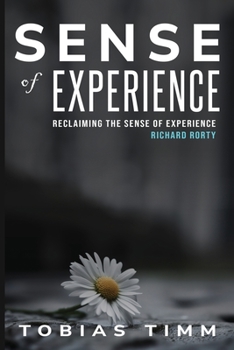Reclaiming the Sense of Experience Richard Rorty
In this dissertation I critically examine Richard Rorty's dismissal of the concept of
experience following the "linguistic turn". I challenge Rorty's belief that all appeals to
experience imply foundationalism and that we should focus only on language. In developing
a non-foundational account of experience I emphasize the qualities of action and meliorism
that we find in Classical Pragmatist notions of experience. I exploit Rorty's concession
that nonlinguistic experiences exist and refute Rorty's claim that these nonlinguistic
experiences remain in the private sphere of life and have no relevance to politics. Then,
examining Rorty's romanticism I observe how Rorty does not address the role that
experience plays in our ability to develop new linguistic schemes.





